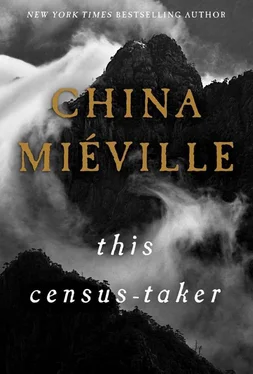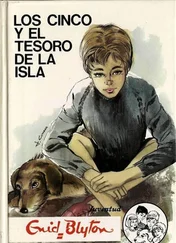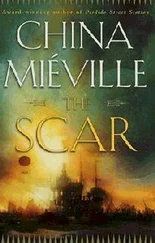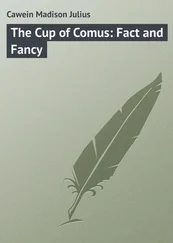“Hush,” Drobe said. “We have to be quick and quiet.”
To the east there are beetles the size of hands and their shells tell fortunes. If you boil them you can chew their dead legs, as did the woman, and suck out narcotic blood. But you didn’t know that then.
“Ah now,” whispered Samma. She spoke in Drobe’s ear and he thought a moment and whispered back and her eyes widened and she nodded.
Perhaps someone was behind you, glancingly visible as the town came into its gray self. You tried to keep watch of any watcher. Drobe yanked you so you lost your grip on Samma’s hand and he pulled you into alleys, and you reached back but Drobe was too strong and fast, and Samma kept on in plain sight on the main way while you left her and headed into the snarls of the south side.
“She’ll come for us, she’ll come,” Drobe said, patting down the hands with which you reached back in her direction. “She’s getting things you’ll need. Come with me.”
Need? It was light so quickly. Drobe rushed you in through the windows of a barely musty cellar. From there, when the rain slowed, through a fence of barrel hoops, by a junction past two big men in butcher’s aprons who put down their tools at the sight of you and came after you yelling, chase instinct provoked by your speed.
In a foundation pit, the weeds were thick so you knew the building was stillborn. You hid while the men hunted. When they were gone, Drobe sniffed as if he could smell empty places. This early the sky looked like an ash version of itself. The air already smelt of diesel and there was smoke to run through.
“Samma’ll bring what you need to go,” he said. Then in a rush he said, “Hey, maybe I’ll come too.”
I didn’t want to go. “And Samma?” I said.
“Well, she can’t, can she?” he mumbled. “She can’t just walk out, can she?”
A big windowless brick hall rose on slanting foundations. Drobe pulled aside corrugated metal and led us into a dusty, still room, where water and wan light angled through the ceiling holes. The floor was deep in bird shit and down. It sloped gently to a stage and a wall of ragged canvas. Things roosted.
“It used to be a picture-house,” Drobe said. I imagined what that might be. “No one’s here,” he said. “Good,” he said.
He hallooed and got no answer.
“Whose house is this?” I said.
“No one’s,” he said. He thought that over. “Sort of.”
We steamed. He went to the stage and lifted a flap of canvas as gently as if it were ripped skin. Behind it was wadded-up cloth and a pile of other things.
On his knees, Drobe picked through someone’s hide. He showed no surprise to find a box of papers covered with ink, some kept pristinely flat, some torn and crumpled, some printed, some handwritten. He touched them. Carefully he examined a stiff envelope banded with red, the remains of its seal visible. I went to pick something up too but he stopped me, made me lean over and look without touching. They weren’t written in my language, and Drobe couldn’t read.
“All right, let’s wait,” he said at last. “Until she comes.”
“Samma,” I said.
“Samma,” he said, “or who these belong to.”
—
There were stairs to where bricks were missing, so you could lie on your tummy and look down at the street, to where a woman prodded a donkey past, dragging a big machine.
“You want to know who lives here for the moment?” Drobe said. “A traveler. I met her.”
“Where?” I said.
“In the streets. She’s a visitor. I ain’t seen her here but she told me this is where she was and this stuff’s hers.”
He pointed at the papers.
“She had a boss, but things went wrong. He thinks he’s done for her but he don’t know her. Don’t know she’s here, watching. She could get away and keep moving. She came here. He took her away from something bad, years gone, so it was like she owed him, she told me. It was all right for a long time, till it weren’t, till she could read all the paperwork and realized things were off.”
I couldn’t follow what he was telling me and I don’t think he understood his own words at all fully; was, rather, trying to accurately repeat someone else’s intrigue. Whoever slept here, he recited, was trying to find someone, not her boss, no, but someone who tracked him, in real authority. To present evidence of a crime. “She could read instructions.” He shook the envelope he still held.
He pointed in the direction, he said, of the places about which he was trying to inform me. “That way,” he said. “They come from there to count.”
I had chalk in my pocket and I gave him a piece. He kept hold of the red-trimmed paper with his left hand to draw frogs in houses and people with wings with his right. I drew my father’s keys and my house and me alone. The rain stopped.
“Samma’ll have a plan,” he said. “We have to get you away.” But I wanted to stay with her and Drobe in their bridge house.
I grew hungry. I sat and was quiet and watched the men and women on south-side errands swigging from flasks.
Drobe startled me by whispering.
“That lizard,” he said. “They put them in the bottle when they’re newborn or even eggs and they put food and water in for them, and they shake it out carefully to clean out their shit, and they grow in there till they get too big to leave.”
I stared at him but he was looking away from me.
“I seen them do it with fish too,” he said. “Fill a bottle with water. Put it in there when it’s fry. I heard they did it with a hare too but I never saw that. A hare in a bottle.”
He looked at me at last.
“Close your mouth,” he said. He was teasing: it wasn’t harsh. I felt light in my head.
We froze then because we heard a rattle and the wrench of metal. We scuttled to a little balcony inside above the main room. Right at its center, her back to us, watching the stage with bags in her hands, was Samma.
“Hey,” Drobe said. But before she turned to look at us someone shouted, “Stop!” and a man walked out of the shadows.
The window-cleaner in his sash again. For one dreadful instant I thought Samma had brought him but I saw her face as she saw his and I knew that he’d followed her without her knowledge.
Two others emerged behind him: one of the butchers, his smock black with blood smears; and a policeman, a real policeman, from the coast.
I’d never seen one before. He was young and fat with long hair and glasses. His uniform was shabby but it was full: I could see the official sigil on his breast. On his right thigh he wore a pistol. His tour had brought him here. It was our town’s turn.
“What, you got nothing better to do?” Samma managed to say as the men approached. She looked at me in anguish.
“I told you,” the butcher said to the window-cleaner. “Didn’t I say I saw him?”
“Boy,” the window-cleaner called up, “what are you doing?”
“I said if you followed her you’d find him, didn’t I?”
Drobe and Samma tried to insist that I was with them now, but the officer simply gestured impatiently for me to come. Then Drobe started on about my father, about how they couldn’t leave me with him, and the window-cleaner grew angry and stamped up the stairs for me, and Drobe started screaming that he was done, that he was going to light out and leave and come by the key-maker’s house for his mate, that he was done with this town, shouting so loud that Samma dropped whatever it was she’d brought to help me escape and ran to quiet him, and knowing how fast someone might withdraw the indulgence of allowing their presence in the houses of the bridge, Samma and Drobe, as he calmed, in agonies and protesting, let the men take me.
Читать дальше












